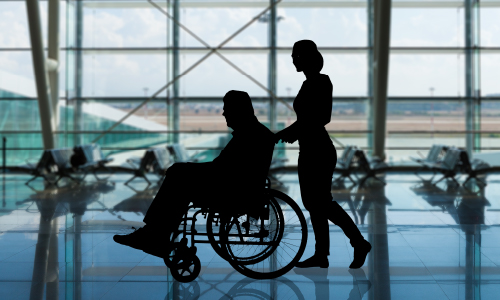Public Transit
Through NJ TRANSIT's Reduced Fare Program, discounted rates are available for people with disabilities and for people ages 62 years and older at any time on all NJ Transit trains, buses, and light rail.
NJ Transit has lift-equipped and kneeling buses as well as accessible rail stations.
With Reduced Fares, you can save 50% or more on a regular one-way fare. Personal assistants ride for free when supporting an individual with a disability with proper ID.
There are two ways to get a reduced fare:
- People with disabilities can show their Medicare Card to the bus driver or train conductor, and seniors can show any government-issued ID that lists your date of birth (drivers license, passport, birth certificate, Medicaid card, MTA Reduced Fare Card, PATH Senior Fare Card, or PA Senior Transit ID)
- Show a NJ TRANSIT Reduced Fare ID (Learn how to apply for one below)
Apply for a Reduced Fare ID
To receive a reduced fare ID, you can apply online, or you can download the application, fill it out, and mail it to the address listed in the application. If you are eligible, you will receive your ID card in about 4 weeks.
Note: Individuals with disabilities will need a physician or nurse practitioner to certify their application. Download the application, and a physician will complete it and mail it in OR you can upload the doctor’s certification with your online application. A physician or nurse practitioner can also certify if you need a personal care assistant to help you ride NJ Transit.
If you have questions, email ReducedFare@NJTRANSIT.com or call 973-491-7112 Monday through Friday, 8:45 am to 4:15 pm or (TTY 800-772-2287 from 8:30 am to 5 pm daily).
If you are blind or visually impaired, you can also call 973-648-3333 to speak with someone at the NJ Commission for the Blind and Visually Impaired for help.
Help Using Public Transportation Independently
If you want help riding public transportation independently, you can enroll in the New Jersey Travel Independence Program (NJTIP).
In partnership with Rutgers University, the program teaches individuals with disabilities and older adults how to safely use public transportation, reading bus and train schedules, planning your trips, paying fares.
The program is free, but you have to pay for your own fares during training.
Training is available in English and Spanish and one-on-one instruction is available as well as group lessons and remote instruction.
When you graduate from the program, you will receive a free one-month bus pass.
You can apply to the program online, or if you have questions or want help, call 848-932-4499 or email njtip_info@njtip.rutgers.edu.
Air Travel
All travelers are required to undergo security screening at airport checkpoints.
If you need help or have questions at the security checkpoint, you or your traveling companion should alert a TSA officer and they can assist you. You can also provide the officer with a TSA notification card that you can print out yourself, or other medical documentation to describe your condition.
If you want help or have any needs, you can ask for a passenger support specialist, who can guide you through the security screening process.
If you have any questions ahead of your trip about screening policies, procedures, or what to expect at the security checkpoint, call TSA Passenger Support at 855-787-2227 or fill out this online request form.
Medications at TSA Checkpoints
Tell the TSA officer you have medically necessary liquids and/or medications when you reach the checkpoint.
Remove these items from your carry-on bag, as these will be screened separately from your other belongings
Also declare accessories associated with your liquid medication such as freezer packs, IV bags, pumps, and syringes. Labeling these items can help make the screening process smoother.
3-1-1 Liquids Rule Exemption: You can bring larger amounts of medically necessary liquids, gels, and aerosols, but you must declare them to TSA officers at the checkpoint for inspection.
If a medically necessary liquid, gel, or aerosol raises an alarm during the security process, it may require additional screening and may not be allowed.
For more information, refer to TSA’s page on special procedures.
 Official Site of The State of New Jersey
Official Site of The State of New Jersey